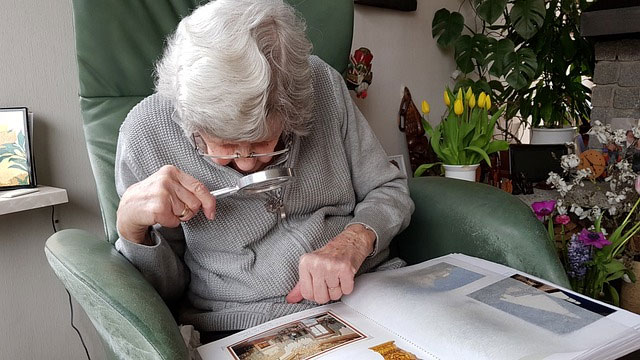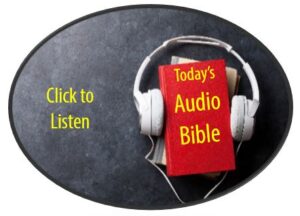
Good morning my “Walking with Jesus” friends,
There is an eye disease called “macular degeneration”. My father has it, as do many, many other people. Normally a person with “macular” will lose their sight slowly over time, with each week being a little darker than the week before. It is only one of many eye illnesses which can cause eventual blindness.
As terrible as it is, what about ‘spiritual blindness’, especially what I call ‘practical-spiritual blindness’? It’s the inability for a person to recognize the love of God in the midst of deep personal pain, or inability to see the miraculous work of God or the miraculous timing of God in the circumstances of life.
The tragedies of life not only tear our hearts apart, but often give us ‘practical-spiritual blindness’. Have you ever found yourself with that malady, unable to see the evidence of God in your pain filled world?

Let’s return to Bethlehem, a small village about 6 miles south of Jerusalem, in about the year 1100bc. Yesterday we walked with widow Naomi back from Moab, where she and her family had been living as refugees escaping a famine. Bethlehem is her hometown yet as she arrives and is welcomed by her dear friends, the avalanche of anger and bitterness toward God about the pain in her life, is amazing, perhaps even shocking. (Ruth 1:19-21)
Yesterday we looked at the legitimate reasons for Naomi’s anger and pain. Today, let’s look at some of the paths God provides out of such pain, because today we can safely assume hundreds of millions of people, perhaps billions of people all around our pain filled world, are living in this type of profound pain and blaming God for their pain!
First, God provided friends! Naomi did not trek back from Moab on that hot, dangerous road alone. Ruth, her Moab daughter-in-law, has left her extended family and her homeland to accompany Naomi out of a sense of great love for Naomi and perhaps a sense of obligation to help care for this dear older widow until death.
But Moabites were not welcome in Israel, just as Israelites were not welcome in Moab. It would likely take a very long time for Ruth to feel she had earned the acceptence of those in Bethlehem, even if she had kindly accompanied angry Naomi. But Ruth also was a widow, so she had her own pain to bear, yet we neither see nor hear any evidence that Ruth’s heart was as wounded and angry as Naomi’s.
Ruth was living out a self-less friendship to Naomi, even if Naomi was unable to see or feel Ruth’s love for her.

Second, God’s attention to Time! The Ruth record says: “So Naomi returned from Moab accompanied by Ruth the Moabitess, her daughter-in-law, arriving in Bethlehem as the barley harvest was beginning.” (Ruth 1:22)
No matter where you live in the world, there’s something special about harvest time, isn’t there? It’s a time of hope, of gratitude to God for the harvest, and often a time of generosity.
Did you know the meaning of the name of the town of Bethlehem is “house of Bread”? Over the years Bethlehem had become known for a place where food was normally readily available, especially bread which in many parts of the world is the very staple of life. Of course for a famine to strike a place known as the ‘house of bread’ would tell us it was a severe famine in the region!
Harvest season would hopefully return Bethlehem to a place of providing food not only for their village but for travelers and even those living in more remote places which did not have such harvests. But even though Naomi would have seen the harvest fields as she walked home from Moab to Bethlehem, we see no evidence that she noticed nor that she gave any thanks to God that He had brought her safely home at the most joyful time of year, harvesttime!
This calls us to ask ourselves an important question. Do you and I suffer from ‘practical-spiritual blindness’, unable to see the evidence of God at work around us? Or worse yet, do we see the evidence but disregard it or discount it as insignificant?
Third let’s notice God’s involvement in the circumstances of life which some might call coincidences.
The Ruth record continues: “Now Naomi had a relative on her deceased husband’s side, from the clan of Elimelech, a man of standing, whose name was Boaz. And Ruth, the Moabitess said to Naomi, ‘Let me go to the fields and pick up the left over grain behind anyone in whose eyes I find favor.’ Naomi said to Ruth, ‘Go ahead, my daughter.’ So Ruth went out and began to glean in the fields behind the harvesters. As it turned out, she found herself working in a field belonging to Boaz…” (Ruth 2:1-3)
In God’s concern for orphans, widows, and refugees among His people, God had given clear instructions, many years before, about the process of harvesting the fields. Harvesters were to leave the grain around the edge of their fields unharvested, and also leave on the ground any grain or sheaves of grain which fall out of the carrying baskets of the harvesters, according to Lev. 23:33 & Deut. 24:19.
Why? So, widows or orphans or even refugees could do exactly what Ruth was doing and not be found guilty of trespassing or stealing, and yet could have some grain they worked to collect, to feed themselves and their families.
Do you see God’s system of His people caring for the less fortunate with dignity? I wonder if you can see things God did in your family or your country, long before your birth, to prepare a means of helping you when you find yourself in desperate, painful circumstances?

In Ruth’s case of course, she had no idea whose field she was working in that day, but God knew and when Ruth found herself in the field of Boaz it was practical evidence that God was working in the details of their widowhood circumstances.
The record continues: “Just then Boaz arrived from Bethlehem and greeted the harvesters working in his field, ‘The LORD be with you!’ He said to the workers. ‘The LORD bless you!’ They replied. Boaz asked the overseer of his harvesters, ‘Who does that young woman belong to?’ The overseer replied, ‘She is the Moabite who came back from Moab with Naomi. She asked me, ‘Please let me glean and gather among the sheaves behind the harvesters. She came into the field and has remained here from morning till now, except for a short rest in the shelter.” (Ruth 2:4-7)
I probably know what you are thinking my friends. What boss greets their workers with “The LORD bless you”? Well, friends, I think it’s fair to say that this is a good example of how many God honoring Israelites, down through the centuries, have worked hard to keep their relationship with God at the very center of their life, therefore even their business conversations were salted with God honoring words.
May I ask, is that true of you, especially if you claim to be a follower of Jesus?
I wonder if we also see the humility and respect Ruth had evidently expressed toward this harvester overseer. Mr. Boaz found himself in a situation I believe we often find ourselves in and yet we are usually totally unaware. Did Boaz have any idea God was working all the details of this normal day of work, so Boaz could meet Ruth and be the source of help to Ruth and Noami which they needed as widows?
Boaz’ words to this Moabite widow picking up loose grain in his field on a hot day are significant: “Boaz said to Ruth, ‘My daughter, listen to me. Do not go and glean in any other field and don’t go away from here. Stay here with my servant girls. Watch the field where my men are harvesting and follow along after the girls. I have told the men not to touch you. And whenever you are thirsty, go and get a drink from the water jars the men have filled.” (Ruth 2:8,9)
Now I presume all of us have had a variety of jobs in our life and I wonder how Boaz’s words compare to words you’ve heard from your bosses over your lifetime. We presume this is the very first conversation they’ve ever had, the first time they’ve ever met. What does his attitude and words tell you about the heart of this Jewish businessman Boaz?
In closing today, how do you suppose Ruth felt that day, her first day gleaning grain in Israel? What was Ruth learning about the God of the Israelites, as compared to the false gods and idols worshipped by her family in Moab? What do you suppose God was doing down deep in Ruth’s grieving widow’s heart?
Let’s pause again to reflect. If you happen to be in a place where you are blaming God for painful things in your life or the evil of our world, please give serious consideration to what I’ve shared with you today that we find in Ruth’s story.
Tomorrow the story continues and it’s very powerful, so let’s meet right back here in the harvest field with Ruth and Boaz tomorrow. Meanwhile here’s a song that reminds us that our pain matters to God!
Bible images provided with attribution to www.LumoProject.com.
Have a comment or question about today’s chapter? I’m ready to hear from you, contact me here.

Pastor Doug Anderson
“Let us run with perseverance the race marked out for us, with our eyes fixed on Jesus…” (Heb. 12:1,2)
Archived back issues of “Walking with Jesus” and other resources are available by clicking here to open our ‘home page’ (or go to HOME at upper right of this page).
Share with friends. Subscribe below for daily “Walking with Jesus”.


